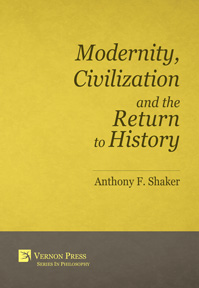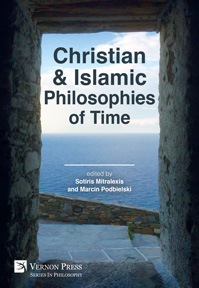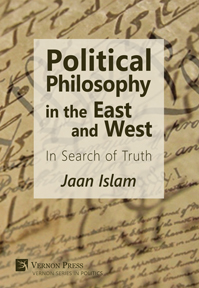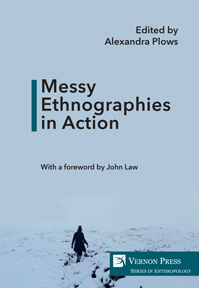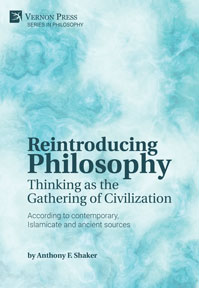Rethinking Islamism beyond jihadi violence
Fighting ideas leaving the sword aside
Elisa Orofino (Ed.)
by Danila Genovese , Dokhanchi Milad (Queen’s University, Canada), Aghil Daghagheleh , Amjad Mohamed-Saleem (Global Peace Institute), Badr Karkbi (Université Mundiapolis, Casablanca, Morocco; Montesquieu Research institute, France), Charles M. Ramsey (Baylor University), Sergio Castaño Riaño (University of Valladolid, Spain), Daniel Rueda (King’s College London), Panos Kourgiotis (Aristotle University of Thessaloniki, Greece), Fatima Zohra Hamrat (Paul Valery University), Jonathan K. Zartman (Air University), Ahmed Meiloud (University of Arizona), Sara Tonsy (IREMAM and Mesopolhis, Institut d’études politiques, France), Sarah Knight (Defence Science and Technology Laboratory (DSTL); University of Portsmouth, UK), Louise Barton (Defence Science and Technology Laboratory (DSTL)), Julius Dihstelhoff (MECAM, Tunisia), Jan A. Ali (Western Sydney University)
Purchase this book
(click here to change currency)
The edited volume “Rethinking Islamism beyond jihadi violence” makes an important contribution to the scholarship on contemporary Islam and in particular the contested and often misunderstood issue of Islamism. Offering critical, nuanced and differentiated perspectives, the various chapters and the book as a whole examine the theological-historical origin and practices of non-violent Islamism, challenging common misconceptions that position it in (too) close proximity to jihadist violence. The various contributors explore Islamism from a range of angles, which allow a holistic analysis of historic, socio-cultural, political and religious-theological dimensions and contextualise the origin, rise and ongoing activism and popularity of key (non-violent) Islamist movements. The book takes a truly global approach, not only through its geographic coverage of Islamism in a range of countries in the Global North and Global South, but also reflected in the diversity of the contributors’ backgrounds, expertise and disciplines.
The book has the potential of promoting a more mature and nuanced academic and public debate on Islamism in various national contexts. Many issues covered in the book, such as the ‘conveyor-belt’ claims or the role of socio-psychological factors of disenchantment and deep dissatisfaction with the status quo of governance, nationally and globally, may be taken up by other scholars in the future for more in-depth explorations.
Dr Mario Peucker
Senior Research Fellow
Institute for Sustainable Industries & Liveable Cities (ISILC)
Victoria University, Melbourne
[...] comprehensive, and well-timed volume on one of the most widely misunderstood and oversimplified issues in the field: the relationship between Islamism and jihadist violence. [...]
[Extract from book review appearing at the online magazine 'European Eye on Radicalization', 13 February 2023.]
For several years now, Islamism has been associated with 'jihadism' and violent extremism both in academia and in contemporary political debates. However, this association can be misleading: Islamism has much deeper roots than 'jihadi terrorism' and it stands as a powerful and complex ideology inspiring thoughts, actions and groups all over the world. Emerging as a protest-for-justice ideology claiming freedom against Western colonisation of the Muslim world, Islamism has triggered both individuals and groups worldwide since the early 1900s. Almost as a sacred ideology – based on the need to revive Islam as the only saving grace for Muslims around the world – Islamism started to be widely associated with 'jihadism' after 9/11. Before then, Islamism was not automatically related to terrorism but to resistance. Given that terrorists are only a small and definite portion of Islamists, this volume aims to re-focus research on Islamism beyond 'jihadism' by collecting relevant contributions on Islamist but non-violent organisations. More precisely, this volume innovatively contributes to current academic debates by exploring the origins of Islamism and the differences between 'jihadism', the evolution of Islamism over time and places and the role played by the most influential non-'jihadist' Islamist organisations active today as powerful non-state actors.
Abstract
Foreword
Notes on Language and Terms
Introduction
Section 1. Exploring Islamism
Chapter 1 Debating Islamism as an Expression of Political Islam
Dr. Milad Dokhanchi
Chapter 2 Islamism and the Constructionof a New Global Social Cosmos
Jan A. Ali
Section 2. Islamism as a form of non-violent resistance
Chapter 3 The Myth of Jihadism: The Rise of Salafi Islam in Iran
Aghil Daghagheleh
Chapter 4 The Role of the British Occupation of Egypt in the Revival and the Evolution of the Islamist Movement
Dr. Fatima Zohra Hamrat Fseil
Chapter 5 The Politics of Representation – The Rise of Muslim Democrats in Sri Lanka as Non-violent Resistance to the Ethnic Conflict
Dr. Amjad Mohamed-Saleem
Chapter 6 German Approaches to the Muslim Brotherhood Between Domestic and Foreign Policy
Dr. Julius Dihstelhoff
Section 3. Non-violent Islamist groups at work
Chapter 7 Tunisia's “Progressive Islamists”: preaching Enlightenment Against Jihad
Badr Karkbi
Chapter 8 The Mainstreaming of Islamism in Pakistan
Dr. Charles M. Ramsey
Chapter 9 Islamism in Spain: The Blurred Line Between Moderation and Radicalisation
Sergio Castaño Riaño
Chapter 10 Contemporary Transnational Islamic Feminist Movements: Seeking Equality Through Islam
Daniel Rueda
Chapter 11 The Tragedy of Islamism in Britain: a Fetishism for Politics. The Case of Hizb ut-Tahrir
Dr. Danila Genovese
Section 4. Debates on the role of non-violent Islamist groups as conveyor belt to violent jihad
Chapter 12 Islah versus Jihad/takfir: Convergent or Divergent Paths Within the Early Muslim Brotherhood?
Dr. Panos Kourgiotis
Chapter 13 The Islamic Renaissance Party of Tajikistan
Dr. Jonathan K. Zartman
Chapter 14 The Distinct Boundaries of Religion and Politics in Modern Islamist Discourses
Dr. Ahmed Meiloud
Chapter 15 The Egyptian Muslim Brotherhood from Sayyid Qutb to 2013: Continuities and Ruptures
Dr. Sara Tonsy
Chapter 16 (Re)Examining the Criticality of Religion in Contemporary Violent Extremism
Sarah Knight and Louise Barton
Final Reflections upon Islamism and Jihadism
Index
Elisa Orofino is a Senior Research Fellow at the Policing Institute for the Eastern Region (PIER) at Anglia Ruskin University, where she leads research on Extremism and Counter terrorism. Her interest in Islamism started in 2009 during her bachelor and continued throughout her academic career. She graduated in Political Sciences cum laude and then expanded her research on Islamist groups and Islamist activism during both her Masters and PhD. She conducted research in different national contexts, including Italy, Egypt, the UK and Australia, where she was awarded her PhD in Islamic Studies from the University of Melbourne. Since 2014, Elisa’s research focus is on vocal/non-violent extremism and its alleged role as conveyor belt to terrorism. Elisa has conducted first-hand research on this topic, taking the non-violent but extreme Islamist group Hizb ut-Tahrir as a case study.
Elisa published extensively on this topic over the years. She is the author of “Hizb Ut-Tahrir and the Caliphate: Why the Group is Still Appealing to Muslims in the West” (London: Routledge, 2020) and several other pieces including edited volumes, journal articles, book chapters and research papers. Elisa also leads different research projects and teaches extremism and counter-terrorism related subjects at both undergraduate and post-graduate level.
Islamism, jihadism, Islamist groups, Islamist activism, extremism
See also
Bibliographic Information
Book Title
Rethinking Islamism beyond jihadi violence
Book Subtitle
Fighting ideas leaving the sword aside
ISBN
978-1-64889-117-5
Edition
1st
Number of pages
410
Physical size
236mm x 160mm

![Rethinking Islamism beyond jihadi violence [Hardback]](/file/18645/1b7204e91535756a374f82c7cd8e5089/1665412827.jpg)

